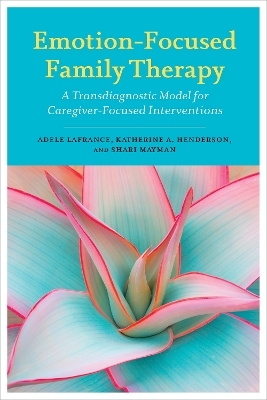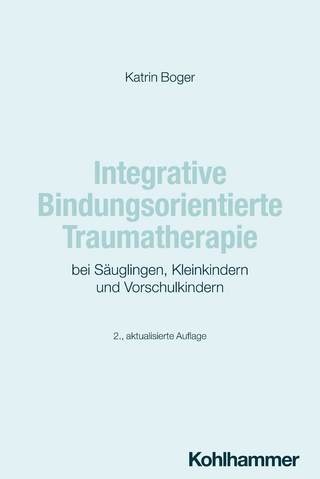
Emotion-Focused Family Therapy
American Psychological Association (Verlag)
978-1-4338-3085-3 (ISBN)
In this treatment manual, Adele Lafrance, Katherine A. Henderson, and Shari Mayman provide mental health professionals with guidelines for implementing emotion-focused family therapy (EFFT), an exciting new intervention in which caregivers are the primary healing agents in their loved one’s treatment.
EFFT was initially created to treat eating disorders, and then developed into a transdiagnostic approach that can be applied to any emotion- or behavior-based disorder with various relationship dynamics across the lifespan, including parent–child relationships (even if the child is an adult) and romantic partnerships. The authors describe how to teach caregivers advanced skills for supporting their loved ones through emotion and behavior coaching. Therapists will also learn collaborative strategies for strengthening healing bonds between the caregiver and the loved one and healing relational ruptures.
Techniques for processing caregivers’ emotional blocks are also explored, as are methods for clinicians to work through their own blocks via supervision. Vivid case examples illustrate the implementation of EFFT in a wide variety of realistic scenarios. Clinical handouts are included in the appendices, which are also available under clinician and practitioner resources.
Adele Lafrance, PhD, is a research scientist, codeveloper of emotion-focused family therapy (EFFT), and licensed clinical psychologist. She is also a founding member of the International Institute for EFFT (https://efftinternational.org/). She has taught numerous courses on developmental and clinical psychology with a focus on family-oriented mental health care across the lifespan. Dr. Lafrance provides EFFT training for clinicians, school boards, and mental health agencies worldwide. She also makes many practical resources for parents, caregivers and clinicians available on her website (https://www.mentalhealthfoundations.ca/). Adele Lafrance lives in Denver, Colorado. Follow @DrAdeleLafrance. Katherine Henderson, PhD, is a licensed clinical psychologist and codirector of Anchor Psychological Services (http://www.anchorpsychology.ca/). She is also an adjunct research professor in the Department of Psychology at Carleton University. Dr. Henderson is recognized internationally for her expertise and research in treating pediatric eating disorders. She codeveloped the two-day EFFT caregiver workshop and Concurrent-CARE (C-CARE), an extension of EFFT for the treatment of concurrent eating and substance use disorders. She provides EFFT and C-CARE training to clinicians and community agencies worldwide and is a frequent speaker within her community on mental health issues. Katherine Henderson lives in Ottawa, Ontario, Canada. Shari Mayman, PhD, is a licensed clinical psychologist and the codirector of Anchor Psychological Services (http://www.anchorpsychology.ca/), a private practice in Ottawa, Ontario. She is an expert in assessing and treating eating disorders and mood and anxiety disorders. She has significant experience in hospital-based eating disorder programs. Dr. Mayman codeveloped the two-day EFFT caregiver workshop and Concurrent-CARE (C-CARE), a treatment model for concurrent eating and substance use disorders that is an extension of EFFT. She provides EFFT and C-CARE training to clinicians and community agencies internationally and speaks frequently on mental health topics. Shari Mayman lives in Ottawa, Ontario, Canada.
Acknowledgments
Introduction
Chapter 1. Emotion-Focused Family Therapy Explained
Chapter 2. Emotion Coaching
Chapter 3. Behavior Coaching
Chapter 4. Therapeutic Apologies
Chapter 5. Working Through Caregiver Blocks
Chapter 6. Working Through Clinician Blocks
Chapter 7. Emotion-Focused Family Therapy for Eating Disorders
Chapter 8: Frequently Asked Questions and Future Directions for Emotion-Focused Family Therapy
Epilogue
Appendix A. The Super-Feeler Explained
Appendix B. Emotion Coaching Cheat Sheet
Appendix C. Behavior Coaching for Cooperation and Compliance
Appendix D. Healing Family Wounds via Therapeutic Apology
Appendix E. Caregiver Styles Self-Reflection Tool
Appendix F. Caregiver Traps Scale
Appendix G. Behavior Coaching – Family Safety Plan for Self-Harm & Suicidality
Appendix H. Relationship Dimensions Scale
Appendix I. Connecting in Relationships: Validating Silence
Appendix J. Processing Caregiver Blocks Using Chair-Work
Appendix K. Clinician Traps Scale
Appendix L. Self-Directed Block Worksheet for Clinicians
Appendix M. Script for Processing Clinician Blocks – Caregiver Involvement
Appendix N. Helpful Resources When Caring for a Loved One With an Eating Disorder
References
Index
About the Authors
| Erscheinungsdatum | 31.10.2019 |
|---|---|
| Zusatzinfo | 6 tables, 1 figure, 1 exhibit, 14 appendices |
| Verlagsort | Washington DC |
| Sprache | englisch |
| Maße | 152 x 229 mm |
| Themenwelt | Geisteswissenschaften ► Psychologie ► Familien- / Systemische Therapie |
| Geisteswissenschaften ► Psychologie ► Klinische Psychologie | |
| Medizin / Pharmazie ► Medizinische Fachgebiete ► Psychiatrie / Psychotherapie | |
| ISBN-10 | 1-4338-3085-X / 143383085X |
| ISBN-13 | 978-1-4338-3085-3 / 9781433830853 |
| Zustand | Neuware |
| Haben Sie eine Frage zum Produkt? |
aus dem Bereich


